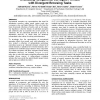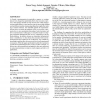537 search results - page 99 / 108 » Improving search engines using human computation games |
CHI
2005
ACM
14 years 9 months ago
2005
ACM
Navigational surrogates are representations that stand for information resources within search engine result sets, e-commerce sites, and digital libraries. They also form the basi...
GECCO
2009
Springer
14 years 1 months ago
2009
Springer
Nowadays, object recognition is widely studied under the paradigm of matching local features. This work describes a genetic programming methodology that synthesizes mathematical e...
PAKDD
2009
ACM
14 years 5 months ago
2009
ACM
Abstract. Since current search engines employ link-based ranking algorithms as an important tool to decide a ranking of sites, Web spammers are making a significant effort to man...
CIKM
1999
Springer
14 years 26 days ago
1999
Springer
The web hasgreatly improved accessto scientific literature. However, scientific articles on the web are largely disorganized, with research articles being spreadacrossarchive site...
KDD
2010
ACM
14 years 14 days ago
2010
ACM
At Google, experimentation is practically a mantra; we evaluate almost every change that potentially affects what our users experience. Such changes include not only obvious user-...


